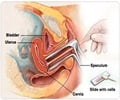46% of women suffering from cancer are under 50, a worrying trend that's likely to continue in the coming years due to lifestyle changes, said doctors.

‘46% of Indian women suffering from cancer are under 50 years of age, a worrying trend that's likely to continue in the coming years due to lifestyle changes.’





Since discussing private body parts is a taboo in many communities in India, women prefer to remain silent until their condition becomes unbearable or incurable, Kaul said. "Discomfort with the process of diagnosis and treatment is an additional concern. Research conducted in other countries suggests women perceive mammography exams as uncomfortable, and these feelings are shared by women in India too," he said.
The disease, especially breast and ovarian cancer, also carries a stigma for women, he said.
According to the National Institute of Cancer Prevention and Research (NICPR), one woman dies of cervical cancer every eight minutes in India. For every two women newly diagnosed with breast cancer, one woman dies of it in India. The data also shows that as many as 2,500 persons die every day due to tobacco-related diseases in India.
Kaul said more young women seem to suffer from breast cancer these days than older women. "Young breast cancer patients have special concerns. Their cancers tend to be more advanced, more aggressive, more likely to be caused by an inherited defective gene, and may respond differently to treatment than do breast tumors in older women. Issues of infertility, body image, and the disease's impact on family life, relationships, career and finances also are different for younger women," said Kaul.
Advertisement
"While tobacco is the leading contributor to cancer, about 40 per cent cases can be ascribed causes such as unhealthy eating and bad sexual habits," Sachdev said.
Advertisement
Source-IANS














